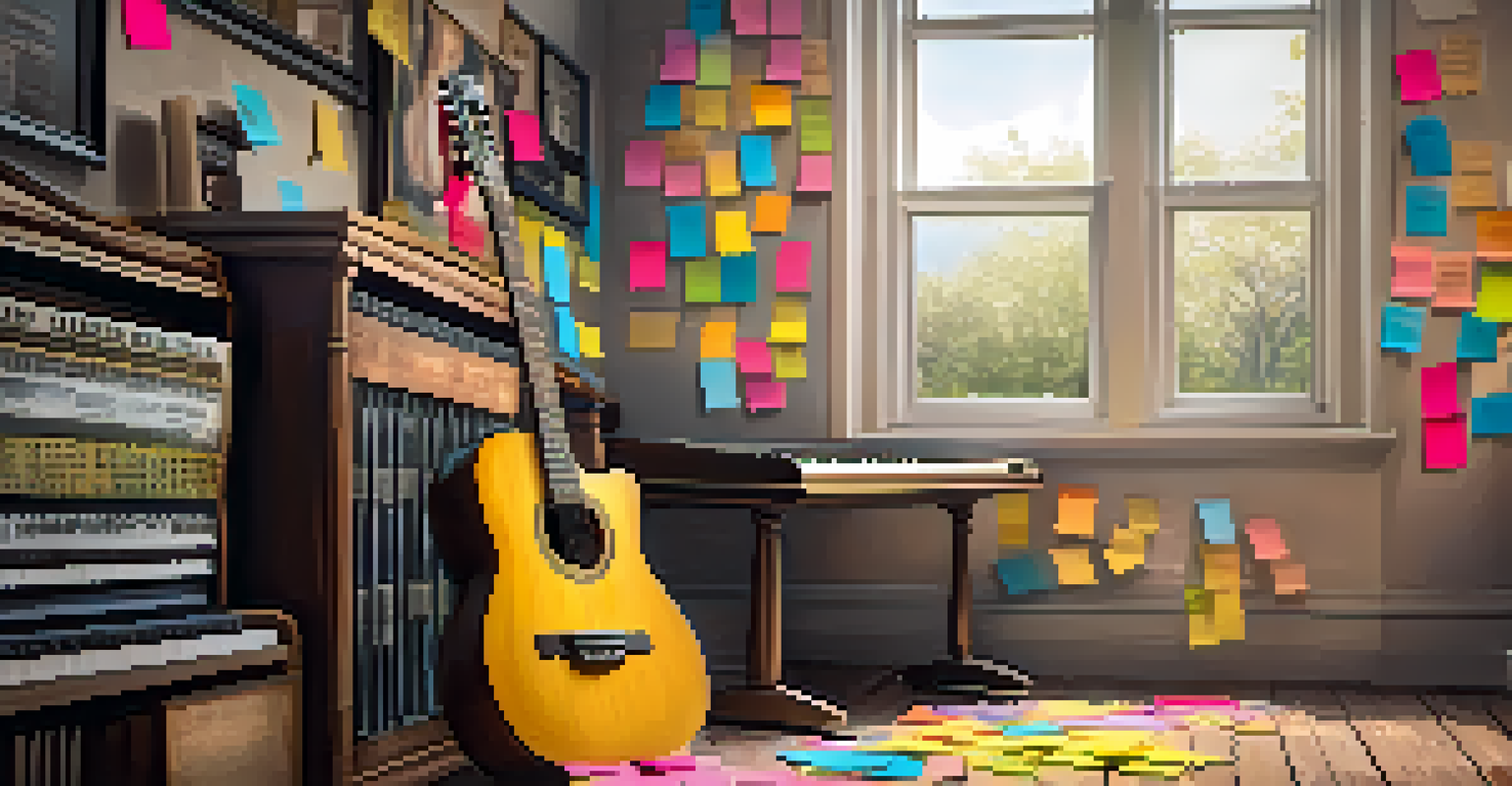Guitar Practice: A Pathway to Better Memory Retention

The Connection Between Music and Memory Retention
Music has a profound impact on our brain, acting as a powerful tool for enhancing memory. When you learn to play the guitar, you're not just picking up a new skill; you're also engaging multiple brain regions involved in memory processing. This is why musicians often have better recall abilities compared to non-musicians.
Music can change the world because it can change people.
Playing the guitar involves memorizing chords, scales, and songs, which can significantly improve your brain’s ability to retain information. For example, when you practice a new song, you’re not just learning the notes; you’re also creating mental pathways that help store this information for the long term. This multi-tasking can lead to better overall cognitive function.
Moreover, the practice of guitar playing can stimulate neuroplasticity, the brain's ability to reorganize itself by forming new neural connections. This means that the more you practice, the more you strengthen your memory capabilities, making it easier to recall not only musical notes but also other types of information in daily life.
How Guitar Practice Engages Different Learning Styles
Learning guitar involves visual, auditory, and kinesthetic learning styles, making it an ideal instrument for enhancing memory. For visually inclined learners, reading sheet music or watching instructional videos can reinforce memory through visual cues. Auditory learners benefit from listening to songs and imitating melodies, while kinesthetic learners engage through the physical act of strumming and finger placement.

This multi-faceted approach ensures that you’re not just memorizing notes but also understanding how they fit together within the context of music. Each style reinforces memory retention in different ways, catering to a broader range of learners. For instance, if you enjoy visual learning, you might find it easier to remember chord shapes when you can see them laid out clearly in a diagram.
Music Enhances Memory Retention
Engaging with music, such as playing the guitar, stimulates various brain regions and strengthens memory capabilities.
By engaging various senses, guitar practice creates a richer learning environment. This method not only makes the process enjoyable but also allows information to be stored more effectively, improving the likelihood of retrieval when needed.
The Role of Repetition in Memory Enhancement
One of the most effective ways to enhance memory is through repetition, and this is especially true in music practice. When you repeatedly play a chord progression or a specific riff, you reinforce the neural pathways associated with that information. This is akin to how athletes train for muscle memory; the more you practice, the more automatic the movement becomes.
The music we listen to may not be as important as the memories we create with it.
In guitar practice, this repetition is not just about playing the same notes over and over. It’s about understanding the structure and context of what you're playing, which helps solidify your memory. For instance, practicing a song daily not only improves your ability to play it but also helps you remember its nuances and emotional impact.
Additionally, spaced repetition—practicing over increasing intervals—can further enhance memory retention. By revisiting pieces after a break, you challenge your brain to recall the information, which strengthens your memory even more, making it easier to access in the future.
Building Emotional Connections Through Music
Emotions play a significant role in memory retention, and music is one of the most powerful emotional triggers we have. When you practice guitar, you’re likely to connect with the music on a personal level, whether it’s a favorite song or an original piece. This emotional connection helps solidify memories related to that music, making them more vivid and easier to recall later.
For example, think about the first song you learned on the guitar. The feelings you experienced while learning it are intertwined with the notes and lyrics, creating a memory that is hard to forget. The more emotionally charged the experience, the stronger the memory—this is why many people recall songs from their childhood with such clarity.
Repetition Reinforces Memory Skills
Consistent practice and repetition of guitar pieces help solidify neural pathways, making it easier to retain musical information.
By consciously choosing to play music that resonates with you emotionally, you can enhance your memory retention even further. Each time you play those pieces, you reinforce the emotional connections, making it easier to remember not just the music but also the moments associated with it.
The Benefits of Learning New Songs for Memory
Learning new songs regularly can be a fun way to enhance your memory skills while also keeping your guitar practice fresh and exciting. Each new piece introduces different chords, rhythms, and techniques, which challenges your brain to adapt and retain new information. This active engagement stimulates memory development in a way that simply repeating old songs may not.
For instance, when you tackle a new song, you’re forced to focus on various aspects such as timing, finger positioning, and emotional expression. This multifaceted approach demands a higher level of cognitive involvement, resulting in stronger memory retention. It’s similar to how diversifying your diet can lead to better overall health; variety in practice leads to a more well-rounded skill set.
Moreover, the satisfaction of mastering a challenging piece can boost your confidence, encouraging you to continue exploring new music. This positive reinforcement enhances your motivation, creating a cycle that fosters both enjoyment and memory improvement.
Social Aspects of Guitar Practice and Memory Impact
Playing guitar often involves social interaction, whether in a band, a jam session, or even just playing for friends. These social settings can significantly enhance memory retention as they create a supportive environment for learning. Engaging with others allows for immediate feedback, shared experiences, and the opportunity to learn from one another.
For example, when you play with others, you might find that you remember songs better because you’re associating them with the social context. The laughter, the camaraderie, and even the friendly competition can create memorable experiences that make it easier to recall the music later on. It’s much like how we often remember fun moments spent with friends more vividly than solitary activities.
Emotional Connections Boost Recall
Emotional engagement with music creates stronger memories, making it easier to recall songs and associated experiences.
Additionally, teaching others what you’ve learned can further reinforce your own memories. When you explain a chord progression or a technique to someone else, you’re not only solidifying your understanding but also embedding that information deeper into your memory.
Setting Goals to Enhance Your Practice and Memory
Setting specific, achievable goals in your guitar practice can create a structured path that enhances memory retention. Goals give you something to focus on, whether it’s mastering a new song, improving your technique, or learning a new scale. This focused practice leads to more effective learning and memory retention than aimlessly playing.
For example, if you set a goal to learn a new song each week, you’ll likely find that you’re more engaged and motivated during your practice sessions. Each goal achieved not only adds to your repertoire but also reinforces the memory of that piece, making it easier to recall in the future. It’s a bit like climbing a staircase; each step takes you higher and builds your confidence.

Moreover, tracking your progress can provide a sense of accomplishment and motivate you to continue. By reflecting on how far you’ve come, you reinforce the memories associated with your journey, making you more likely to remember both the music and the effort you put into learning it.